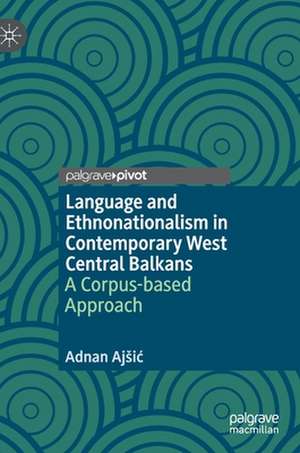Language and Ethnonationalism in Contemporary West Central Balkans: A Corpus-based Approach
Autor Adnan Ajšićen Limba Engleză Hardback – 4 iun 2021
Preț: 486.42 lei
Nou
Puncte Express: 730
Preț estimativ în valută:
93.09€ • 96.59$ • 77.80£
93.09€ • 96.59$ • 77.80£
Carte tipărită la comandă
Livrare economică 17-31 martie
Preluare comenzi: 021 569.72.76
Specificații
ISBN-13: 9783030721763
ISBN-10: 3030721760
Pagini: 180
Ilustrații: XII, 180 p. 3 illus.
Dimensiuni: 148 x 210 mm
Greutate: 0.39 kg
Ediția:1st ed. 2021
Editura: Springer International Publishing
Colecția Palgrave Macmillan
Locul publicării:Cham, Switzerland
ISBN-10: 3030721760
Pagini: 180
Ilustrații: XII, 180 p. 3 illus.
Dimensiuni: 148 x 210 mm
Greutate: 0.39 kg
Ediția:1st ed. 2021
Editura: Springer International Publishing
Colecția Palgrave Macmillan
Locul publicării:Cham, Switzerland
Cuprins
Chapter 1: Introduction.- Chapter 2: Central theoretical concepts and the current research context.- Chapter 3: Data and Methods.- Chapter 4: Quantitative results by method.- Chapter 5: Qualitative results by method.- Chapter 6: Language-related discourses, language ideologies, and ethnonationalism.- Chapter 7: Conclusion.- Chapter 8: Coda: Big Data vs. Small Minds.
Recenzii
“The book offers insightful ideas regarding the interactions between language and ideology, particularly the discursive-ideological complex of regional ethnonationalism. Therefore, it can be a valuable reference for students, scholars, and researchers engaged in critical discourse studies, corpus linguistics, and language politics.” (Zhonghua Wu and Le Cheng, Journal of Language and Politics, Vol. 21 (4), 2022)
Notă biografică
Adnan Ajšić is Assistant Professor of English at the American University of Sharjah, United Arab Emirates. His writing has appeared in Applied Linguistics, Corpora, Journal of Language and Politics, Language Policy, and Times Higher Education as well as volumes published by Routledge, Wiley-Blackwell, and Multilingual Matters. He has served as an interpreter/translator for the United Nations’ International Criminal Tribunal for the former Yugoslavia (ICTY) in The Hague, the Netherlands.
Textul de pe ultima copertă
This book uses a specialized corpus of public language-related discourse to investigate links between language ideologies and ethnonationalism in contemporary West Central Balkans. Despite a century and a half of shared linguistic history, the nations making up the central part of former Yugoslavia continue to debate the ownership over the common language, creating much animosity, some legal issues, and often absurd circumstances. At the heart of the ongoing language debate over Central South Slavic is the belief in language as the cornerstone of ethnonational identity and the legitimacy of ethnic groups’ claims to sovereignty. Given a history of conflict and the recent resurgence in extreme ethnonationalism, an understanding of ethnolinguistic contestation in the region is as important as ever. This book will be of interest to social scientists working in fields as diverse as (applied) linguistics, anthropology, media studies, political science, sociology and history, as well as other scholars with an interest in language and society.
Adnan Ajšić is Assistant Professor of English at the American University of Sharjah, United Arab Emirates. His writing has appeared in Applied Linguistics, Corpora, Journal of Language and Politics, Language Policy, and Times Higher Education as well as volumes published by Routledge, Wiley-Blackwell, and Multilingual Matters. He has served as an interpreter/translator for the United Nations International Criminal Tribunal for the former Yugoslavia (ICTY) in The Hague, the Netherlands.
Adnan Ajšić is Assistant Professor of English at the American University of Sharjah, United Arab Emirates. His writing has appeared in Applied Linguistics, Corpora, Journal of Language and Politics, Language Policy, and Times Higher Education as well as volumes published by Routledge, Wiley-Blackwell, and Multilingual Matters. He has served as an interpreter/translator for the United Nations International Criminal Tribunal for the former Yugoslavia (ICTY) in The Hague, the Netherlands.
Caracteristici
Uses a large corpus of public language-related discourse, incorporating 34 million words from 53 thousand newspaper articles Addresses a topical area of research in applied linguistics and discourse analysis Demonstrates a novel, three-step approach to the identification of language ideologies
